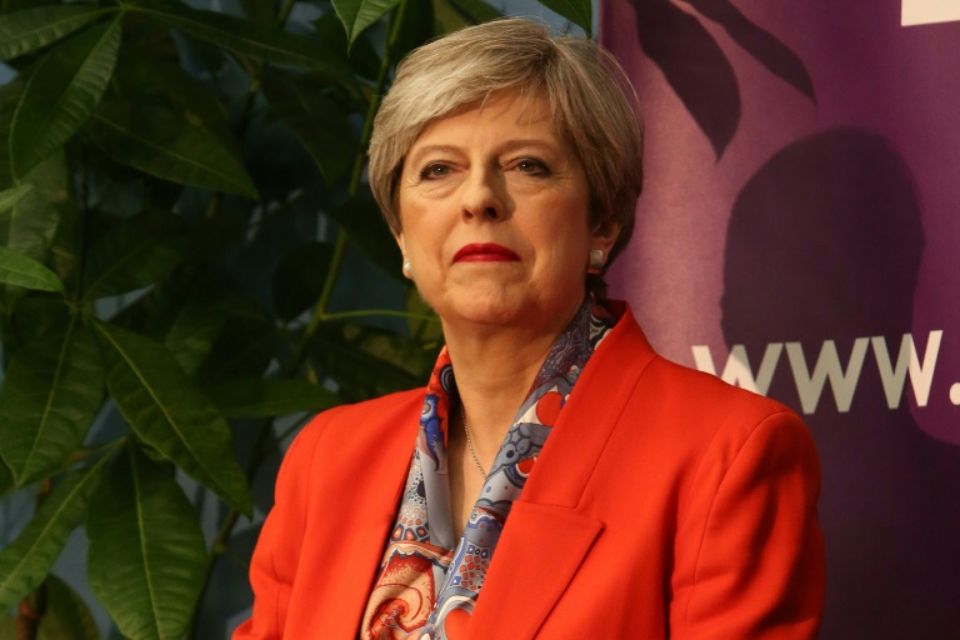British Prime Minister Theresa May announced on Friday that she will form a new government despite the general election shock that saw her lose her parliamentary majority.
After asking Britain’s Queen Elizabeth for permission to form a new government, May said she could rely in parliament on the support of her “friends” in Northern Ireland’s Democratic Unionist Party after her governing Conservatives failed to win a majority.
“We will continue to work with our friends and allies in the Democratic Unionist Party in particular,” she said on the doorstep of her official Downing Street residence.
“Our two parties have enjoyed a strong relationship over many years and this gives me the confidence to believe that we will be able to work together in the interests of the whole United Kingdom.”
“We will fulfill the promise of Brexit together and over the next five years build a country in which no one, and no community, is left behind,” May said.
“This will allow us to come together as a country and channel our energies towards a successful Brexit deal that works for everyone in this country, securing a new partnership with the EU which guarantees our long term prosperity.”
The DUP – which staunchly defends Northern Ireland remaining part of the United Kingdom, and takes a conservative approach to social issues – increased its number of seats to 10 in Thursday’s election.
The DUP said earlier on Friday it would not comment on reports that it had agreed to back May’s ruling Conservatives. Some political analysts doubt a Conservative minority government with support from the DUP would last over the long term, and think a second election is likely.
Confident of securing a sweeping victory, May had called the snap election to strengthen her hand in the European Union divorce talks. But in one of the most sensational nights in British electoral history, a resurgent Labor Party denied her an outright win, throwing the country into political turmoil as
no clear winner emerged.
With 649 of 650 seats declared, the Conservatives had won 318 seats and Labor 261.
May’s Labor rival Jeremy Corbyn, once written off by his opponents as a no-hoper, said May should step down and he wanted to form a minority government.
“The mandate she’s got is lost Conservative seats, lost votes, lost support and lost confidence,” he said. “I would have thought that’s enough to go, actually, and make way for a government that will be truly representative of all of the people of this country.”
Meanwhile, First Minister Nicola Sturgeon said on Friday that the Scottish National Party will work to forge an alliance to keep May’s Conservatives out of power after the inconclusive result to Britain’s national election.
“We will work with others, if it is at all possible, to keep the Tories out of government. We have always said that we would work in alliance with others to promote progressive policies to build a fairer country,” Sturgeon said.
As Britain risked political deadlock after May’s gamble on a snap election left her short of a majority in Britain’s parliament, election losses by the Scottish National Party (SNP) undermined Sturgeon’s bid for a second independence vote.
The election results have cast a dark shadow over the fate of the Brexit negotiations.
“We need a government that can act,” EU Budget Commissioner Guenther Oettinger told German broadcaster Deutschlandfunk. “With a weak negotiating partner, there’s a danger that the (Brexit) negotiations will turn out badly for both sides.”
The EU’s chief negotiator said the bloc’s stance on Brexit and the timetable for the talks were clear, but the divorce negotiations should only start when Britain is ready. “Let’s put our minds together on striking a deal,” Michel Barnier said.
But there was little sympathy from some other Europeans.
“Yet another own goal, after Cameron now May, will make already complex negotiations even more complicated,” tweeted Guy Verhofstadt, the former Belgian premier who is the European Parliament’s point man for the Brexit process.
May’s predecessor David Cameron sought to silence Euroskeptic fellow Conservatives by calling the referendum on EU membership. The result ended his career and shocked Europe.
May had unexpectedly called the snap election seven weeks ago, even though no vote was due until 2020. At that point, polls predicted she would massively increase the slim majority she had inherited from Cameron.
May had spent the campaign denouncing Corbyn as the weak leader of a spendthrift party that would crash Britain’s economy and flounder in Brexit talks, while she would provide “strong and stable leadership” to clinch a good deal for Britain.
But her campaign unraveled after a policy u-turn on care for the elderly, while Corbyn’s old-school socialist platform and more impassioned campaigning style won wider support than anyone had foreseen.
Analysis suggested Labor had benefited from a strong turnout among young voters.
In the late stages of the campaign, Britain was hit by two extremist militant attacks that killed 30 people in Manchester and London, temporarily shifting the focus onto security issues.
That did not help May, who in her previous role as interior minister for six years had overseen cuts in the number of police officers. She sought to deflect pressure onto Corbyn, arguing he had a weak record on security matters.
